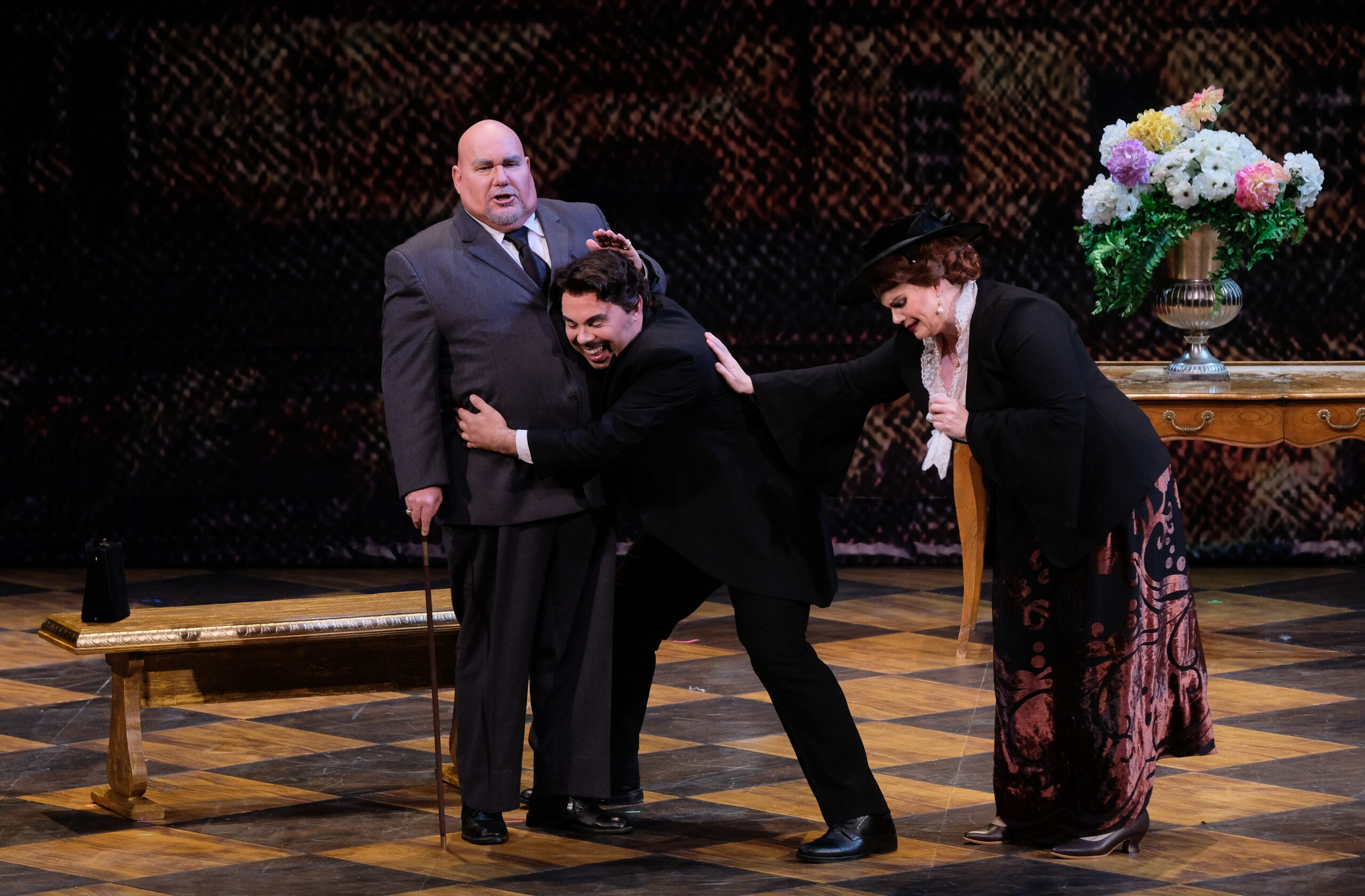July 26, updated July 27
Allan Kozinn
Every operagoer has a favorite work, which can change over time – when, for example, a transcendent performance of another work pulls you into that opera’s orbit. For me, opera doesn’t get better than “Marriage of Figaro,” which Opera Maine presented in a graceful staging Wednesday evening at Merrill Auditorium.
What puts “Figaro” at the top of the list? Its libretto by Lorenzo da Ponte (based on the play by Pierre-Augustin Caron de Beaumarchais) packs in comedy and pathos, and Mozart’s music moves easily, and astutely, between them. The final scene, for example, pivots from near-slapstick to deeply moving in an instant, and then morphs into a bright, celebratory chorus. And if its skewering of the nobility’s hypocrisy seems less revolutionary now than it did when the opera was new, in 1786, the count’s insistent sexual harassment of Susanna, his wife’s maidservant, has a new resonance in the #MeToo era.
Add to that an almost nonstop stream of emotionally pointed, melodically exquisite arias – the countess’s poignant “Porgi amor” and “Dove sono,” Susanna’s passionate “Deh vieni, non tardar,” Cherubino’s ballads of breathless teenage lust and love, “Non so più” and “Voi che sapete,” for starters – as well as brilliantly timed ensemble pieces, like the septet at the end of Act 2 or that incredible closing scene. And if you listen closely enough, you can spot the roots of both Wagner (in Mozart’s use of recurring motifs to represent specific feelings – suspicion and forgiveness, most notably) and, of all things, Gilbert and Sullivan (in its brisk, carefully-timed comic turns, not to mention the sub-plot in which Figaro’s unlikely parentage is established).
Opera Maine’s staging, ably directed by Dona D. Vaughn, the company’s artistic director, was modest, efficient and attractive, as its productions tend to be. The action was moved from Mozart’s time to the late 19th or early 20th century, or so Millie Hiibel’s costumes suggested. That’s hardly a radical update, these days. The director Peter Sellars famously set his late-1980s production in the Trump Tower, in Manhattan.
Christopher Akerlind built his sets around a large backdrop showing Count Almaviva’s castle, and in its second act, its large gardens – a change necessary for Cherubino’s leap into it, accomplished here by running between panels of the hanging backdrop. But for a few pieces of furniture, a couple of stylized sculptures meant to suggest the castle’s pine grove and a pair of freestanding doors at either side of the stage, that was it. Unless you’re going the Sellars route, you don’t really need much more.
I was half expecting Opera Maine’s production to build on that, perhaps by transforming the count into Harvey Weinstein or Bill Cosby. Actually, Keith Phares, who sang the count here, looked more like Clark Gable, which suited the rakish character just as well. His foppish sidekick, Basilio, on the other hand, played by Robert Brubaker with a perfect blend of oiliness and glee, sported an oddly familiar orange wig.
The cast was well-balanced and consistently strong. Robert Mellon brought a good sense of comic timing to the title role, but also used his solo turns – his angry, scheming cavatina, “Se vuol ballare,” his comic set piece, “Non Non più andrai,” and his momentarily heartbroken “Aprite un po quegli occhi” – to make Figaro a more three-dimensional character.
Maeve Höglund, as Susanna, Figaro’s bride, offered a similarly nuanced performance, both on her own – her account of “Deh vieni” was a delight – and in her ensemble interactions. The countess has fewer sides to her than Figaro and Susanna, but Danielle Pastin fully captured her sense of abandonment and disappointment in her two main arias and in her wistful duet with Susanna, “Che soave zeffiretto.” She also, of course, has the opera’s most wrenching moment, captured in a single line at the end of the opera, which Höglund delivered with a truly regal sensibility.
Phares, in fine voice, captured the count’s assured sense of entitlement, which made his more subtle approach to his character’s irritation at being constantly thwarted by Figaro, Susanna, the countess and even the young servant Barbarina, work all the more powerfully. And if Hongni Wu, as Cherubino, occasionally crossed the line separating comic and goofy, she sang the young page’s arias vividly and proved a magnificent comic foil in several of her scenes.
In the smaller roles, Kevin Glavin, as Bartolo, and MaryAnn McCormick, as Marcellina, proved agile, comic players; Yi Wang was an amusingly assured Barbarina and gave a lovely account of her sole aria, “L’ho perduta, me meschina.”
Stephen Lord conducted a taut, stylish performance, using a large but trim-sounding orchestra that embraced Mozartean style to the extent of using a harpsichord to support the recitatives.
Allan Kozinn is a former music critic and culture writer for The New York Times who lives in Portland. He can be contacted at:
Twitter: kozinn

